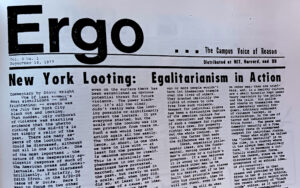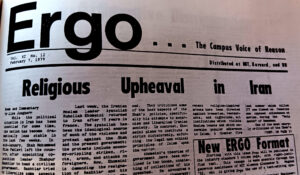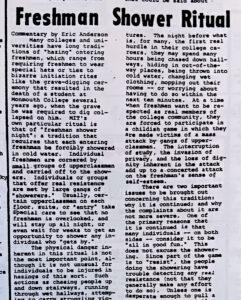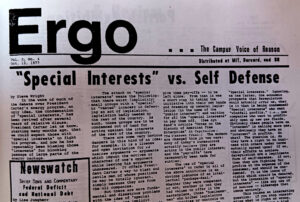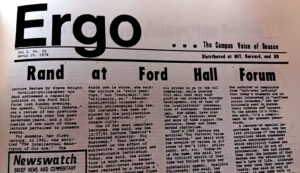Ergo: The Campus Voice of Reason. That was the name of our paper. Like all college students, we were more confident we were right than we should have been, but we stood apart from the crowd. As an organization, we were never “liberal” or “conservative” in the popular sense of the words. Our position was libertarian, strongly influenced by Ayn Rand’s philosophy of Objectivism. Ergo challenged university administrators, the campus left, politicians, and academics. My association with Ergo helped me to develop a framework of thought that I still go by. My views on what is important and how to achieve it have changed, and so have some of my conclusions, but my basic principles have changed very little.
Ergo came into being during a time called the “sixties,” which lasted from about 1965 to 1975. The founder was J. R. M. Seitz, who allegedly acquired all the parts necessary to build an Atlas missile (except the nuclear warhead) on the open market. It was the time of the Vietnam War and urban riots. It was a time of protests and violence. People marched and occupied buildings. Some thought that totalitarian Communist states were a great idea. Others just wanted the government to stop drafting people and sending them into an undeclared war on the other side of the globe. Once I was punched in the nose, and another time the sweater I was wearing was set on fire. I can’t count the number of times I was called a fascist. Interesting times.
But campuses were open to all kinds of voices. The idea that words cause literal injury wasn’t widespread then (though you might be literally injured if someone didn’t like your words). I don’t recall any cases where people lost their jobs for the views they expressed. One of those voices came from a little office in the basement of MIT’s Walker Memorial, starting around 1968. It was a little weekly libertarian-conservative newspaper called Ergo. Shortly after my becoming a freshman in 1969, I looked in on it. Its views roughly matched mine of the time, and I enjoyed writing, so I became part of the staff.
At the time, a computer was a gigantic, expensive machine kept in a room with limited access. Using one to produce a publication was years in the future. We created copy on an IBM Selectric typewriter, made corrections with white-out, laid the paper out with hot wax adhesive, and sent the boards to a printer. After a couple of years we moved to the Student Center on the west side of campus and got a device to photograph headlines from film strips, one letter at a time. We used it in a makeshift darkroom which OSHA shut down just to be nasty. (They did it to other MIT activities as well.)
The ideas at Ergo shifted in a more libertarian and less conservative direction, with strong influence from a group of Ayn Rand admirers called “Radicals for Capitalism.” As I came to recognize the logical problems with religion, my views moved the same way. For a while Ergo was subtitled “The Rational Voice of Libertarianism,” then later “The Campus Voice of Reason.” It’s not a complete coincidence that Reason magazine started about the same time as Ergo in the Boston area. Distribution of Ergo spread to Boston University and Harvard, and some staff members were from those schools.
At the time, Rand spoke every year in Boston. Many of us went to hear her talk and to hand out sample copies in the hope of getting subscribers. It worked pretty well. We never came within the “true believer” orbit, though. We recognized she could be wrong. For her part, she once denounced our handing out samples as “poaching.” It was a healthier relationship than making our minds conform to everything she said.
The paper’s most successful campaign was against a common hazing practice. In some dorms at MIT (which were male-only then, except for one women-only house), it was common for upperclassmen to forcibly drag freshmen into a shower fully clothed. Today this would be recognized as plain assault. Some articles in Ergo played a leading role in ending the practice.
A less successful campaign concerned the philosophy department. It was dominated by “analytic philosophy,” which focuses on analyzing concepts and language at the expense of the traditional business of philosophy, understanding reality. A long series of articles tried to get the department to become more diverse in the philosophical approaches it represented. There was a heavy push to do this by hiring an Objectivist philosopher, which was a bad move, making it look like an “our orthodoxy vs. their orthodoxy” battle. The philosophy department eventually merged with the linguistics department, which made its analytic bias obvious but didn’t help to get students a broader education.
I wrote quite a few articles, mostly news analysis and book reviews. Some of these reviews are up on my personal website:
- Nathan Glazer, Affirmative Discrimination
- James Hogan, Code of the Lifemaker
- Jacqueline Lichtenberg, Sondra Marshak, and Joan Winston: Star Trek Lives!
In addition, I spent a lot of time walking up and down Massachusetts Avenue, trying to get local shops to buy ads. On one amusing occasion, I converged with people from two other MIT publications, trying to do the same thing.
A few people who wrote for Ergo went on to successful writing careers. Paul Schindler and Robert Bidinotto are names some people will recognize.
Ergo continued long after I graduated, and I hung around after returning from graduate school in the Midwest. Other people hung around as well, till it became questionable how much the paper was still a student publication. The acceptance of free office space from MIT started to seem like a fraud, and I drifted away. The last issue was published sometime in the 1980s.
I doubt that Ergo could exist at most American universities today. Students would complain of needing medical attention for their injured feelings. Administrators would claim that by differing from the orthodoxy, the paper failed to be “diverse.” Ergo suffered from some petty vandalism — stacks of papers put out to be picked up would sometimes vanish — but the administration left us alone. It would be much rougher today.
During its peak years, though, Ergo provided a counterweight to the collectivist ideas that dominated campus discussion. I’m proud to have been part of it.
This piece is mostly written from memory, and it was a long time ago. Apologies for any errors.
Here are some pictures of archival copies of Ergo, from a bound collection I still have. Click on the thumbnails to see a larger image:
